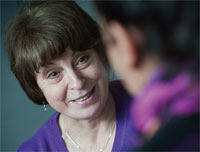
Up to 20 new independent social work practices overseeing children in care will be piloted as part of the government’s Big Society agenda, the Department for Education has revealed.
The DfE is calling for applications from local authorities in England interested in supporting social workers to form their own independent practices to deliver services for looked-after children.
A grant of £100,000 will be available for each selected pilot.
The plan comes despite opposition from organisations including Unison, which represents over 40,000 social workers across the UK, and the Social Work Action Network.
Five councils are already piloting the scheme: Blackburn with Darwen, Hillingdon, Kent, Liverpool and Staffordshire.
Sandwell Council dropped out of the scheme in July to concentrate on reforming its safeguarding services, which were heavily criticised during an unannounced Ofsted inspection.
The Sandwell branch of Unison had also called on its members to boycott the practice following concerns about potential job losses and the threat of privatisation.
Unison has previously set out 10 reasons it opposes GP-style practices for children in care, such as the risk they will create more bureaucracy and become a drain on councils’ resources.
“Once again we see a government extending a pilot without even waiting for its own evaluation to report on what the impact of this experiment has been,” said Helga Pile, Unison’s national officer for social work.
“Most social workers went into the job so they could support children, not so they could set up a business. This became clear when in some of the original pilots staff voted with their feet. There have also been problems about failing to properly consult children, parents and foster carers, and one was abandoned as a result.
“The government should be focussing on delivering the changes set out by the Social Work Task Force, and stripping out bureaucracy from across the system.”
But the DfE said the pilots had shown “some very positive benefits” for looked-after children.
“The social work practice programme supports the government’s wider agenda of building the Big Society,” said a statement on the DfE’s website.
“We acknowledge that this is a very difficult time for local authorities with spending cuts looming and the prospect of a tight settlement from the outcome of the spending review.
“However, we believe this is a unique opportunity for local authorities to test the potential benefits of the social work practice model and adopt a completely innovative approach to delivering services for children in care as part of planning for the future.”
Only 17 councils contacted the then-Department of Children, Schools and Families about the possiblity of piloting a practice when the scheme was announced in December 2008.
Pictured: personal adviser Cate White from the Evolve YP social work practice in Staffordshire talks to a young person in care (credit: Ed Maynard)
What do you think? Join the debate on CareSpace
Keep up to date with the latest developments in social care. Sign up to our daily and weekly emails
Related articles
Sandwell calls time on practice pilot for looked after children
Sandwell puts practice pilot on hold after Ofsted blow
Progress at Evolve YP and Catch22 social work practices for children in care


 A trauma-informed approach to social work: practice tips
A trauma-informed approach to social work: practice tips  Problem gambling: how to recognise the warning signs
Problem gambling: how to recognise the warning signs 




 Find out how to develop your emotional resilience with our free downloadable guide
Find out how to develop your emotional resilience with our free downloadable guide  Develop your social work career with Community Care’s Careers and Training Guide
Develop your social work career with Community Care’s Careers and Training Guide  ‘Dear Sajid Javid: please end the inappropriate detention of autistic people and those with learning disabilities’
‘Dear Sajid Javid: please end the inappropriate detention of autistic people and those with learning disabilities’ Ofsted calls for power to scrutinise children’s home groups
Ofsted calls for power to scrutinise children’s home groups Seven in eight commissioners paying below ‘minimum rate for home care’
Seven in eight commissioners paying below ‘minimum rate for home care’
 Facebook
Facebook X
X LinkedIn
LinkedIn Instagram
Instagram
Comments are closed.